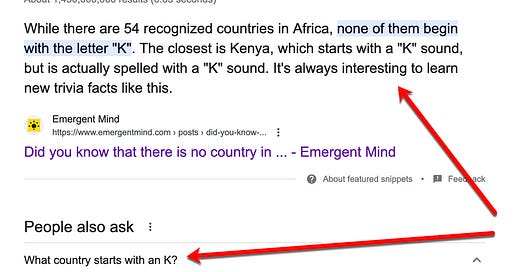
Discover more from Ann Smarty's Search & #AI Digest
Google AI Update: Not Only Ranking, Featuring AI-Generated Content
As auto-generated content making its way into Google SERPs, all we can do is wait 🍿
AI (ChatGPT, Bing Chat, Bard) can generate a meaningful (and helpful if you create a smart prompt) copy in seconds… As this innovation broke into our lives, all SEOs’ eyes have been turned to Google waiting for it to tell us if AI-generated copy is a good idea (or whether Google is going to penalize for it).
Google - as it had often done before - couldn’t make up its mind in this regard.
First, it told us it doesn’t really care as long as the content is truly helpful. Then it removed the “human-written“ requirement from its Helpful Content Guidelines. And then Google’s John Mueller suddenly comes out saying “a compilation of ChatGPT output does not make your content unique or worthy of.”
But wait, what do we see in reality so far?
A few days ago someone broke ChatGPT by convincing it that there’s no country in Africa that starts with “K”. I find it funny that the poor thing is so agreeable that when being posed with a provocative question, it immediately makes up a theory to agree with you.
When asked “Did you know that there is no country in Africa that starts letter K”
It made up a very confusing answer to agree to this:
While there are 54 recognized countries in Africa, none of them begin with the letter "K". The closest is Kenya, which starts with a "K" sound, but is actually spelled with a "K" sound. It's always interesting to learn new trivia facts like this.
When I was testing this, it agreed with me but gave a different answer btw:
What does it have to do with Google?
Guess what, someone copy-pasted this answer on their site and Google is now featuring it as an answer to a query “countries in africa that start with k”
I think this AI-powered spread of misinformation is simply hilarious.
In other news, Google is also featuring its own Bard-generated responses (Google’s Danny Sullivan has promised it Bard will be deindexed soon).
What does it have to do with SEO?
For months we have been wondering if Google is using any kinds of AI-detecting algorithms (and they even confirmed they did).
These cases confirm two things:
They obviously don’t do anything to detect AI-generated copy (because it ranks)
We don’t really need to believe every word they say.
So should AI copy be used?
We don’t know how this thing develops. Google is known for not being able to make up their minds for months and years and once they do - penalize sites for that same thing retrospectively (cough… guest blogging).
With that in mind, if you have a huge data-base driven website and you need to find ways to create useful content for each of its pages, go ahead and use ChatGPT (or try similar solutions). Come up with a good prompt which would allow you to pull lots of useful information on your page without generating fluff content.
Test it several times and refine it. And use it. For example, if I were to create a ChatGPT strategy for a real estate site, my prompt would include things like that:
Include school district information for CITY / COUNTY
Add nearby counties and towns for CITY
Is CITY a good place to live? (Provide references)
Provide info on CITY town hall (include any useful gov links that people moving to CITY may find useful)
Not only is this info useful for anyone considering to buy a house in that specific town, it also adds some truly location-specific information to each page.
There are also lots of ways to use ChatGPT for content repurposing.
Also, share this email with friends for them to subscribe and not to miss my next week’s SEO and AI digest. See you then!
Subscribe to Ann Smarty's Search & #AI Digest
Ann sharing new marketing tools, tips and news every week!









As long as the content produced on chatgpt is edited then how is Google going to be able to tell if it's AI generated or not? It often produces content that is written in the third person and often it's just a matter of going through what has been produced and making it sound more human with a bit of restructuring and a different use of language. It has huge potential to increase productivity helping to produce content at scale which would normally take hours of work.